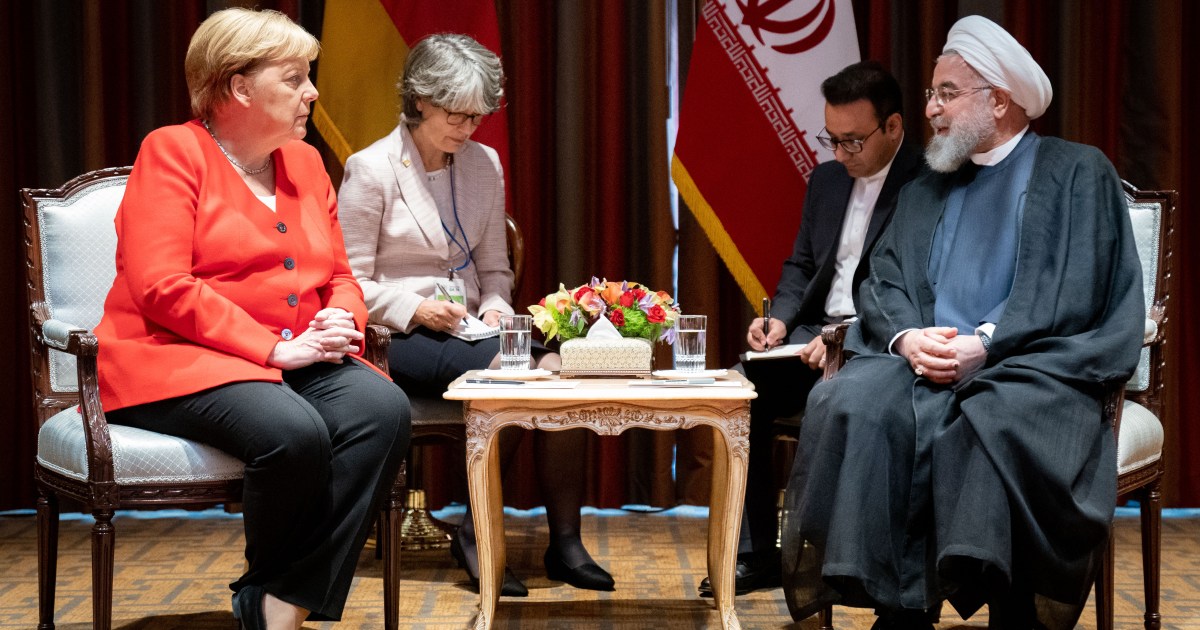German Chancellor Angela Merkel called on Iranian President Hassan Rouhani today to the need for Tehran to send positive messages to increase the chances of returning to the nuclear agreement concluded in 2015 and ending the confrontation with Western powers, a day before a meeting between the foreign ministers of America, France, Germany and Britain discussing the Iranian nuclear file.
Merkel's spokesman said that the German Chancellor told Rouhani in a phone call that she was concerned about Tehran's violation of its obligations under the nuclear deal, which US President Joe Biden would like to return to if Iran halts its nuclear activities.
"The time has come for positive gestures that raise confidence and increase the chances of a diplomatic solution," the German chancellor’s spokesman added in a statement.
On the other hand, Rouhani said in his call with Merkel that "if the Europeans want to preserve the nuclear agreement, they must prove it in practice."
The Iranian leadership insists on the need for Washington to first return to the agreement from which the administration of former US President Donald Trump withdrew in 2018, and to undo the severe sanctions imposed by the Trump administration after the withdrawal.
Before the phone call, Iran's Supreme Leader Ali Khamenei said today that what is required of the United States is "actions, not words" if it wants to revive the nuclear deal.
In a speech broadcast on Iranian state television, Khamenei added that his country's response regarding the nuclear deal will be proportional to the measures taken by the other signatories to the nuclear agreement, noting that there were many promises regarding the nuclear deal in the past, but without any practical steps to implement them.
Diplomatic efforts
As part of diplomatic efforts to revive the nuclear agreement, the French Foreign Ministry spokeswoman announced in a statement today that Minister Jean-Yves Le Drian will receive in Paris his German counterparts Heiko Maas and British Dominic Raab, and the US Secretary of State will join them via video link in a meeting "devoted mainly to Iran and regional security in Middle east".
The US-European meeting comes days before a concern that raises concern, under a law passed by the Iranian Shura Council (parliament), which is dominated by conservatives last December, the government must reduce the activities of inspectors of the International Atomic Energy Agency, in the event that sanctions are not lifted.
Iranian Foreign Minister Mohammad Javad Zarif indicated in previous statements that the time limit provided by the law before taking this step expires on February 21.
The Iranian parliament’s decision is part of Tehran’s policy of gradually abandoning its obligations under the nuclear agreement, in response to the US withdrawal from the agreement, and the inability of the rest of the signatories to the agreement to guarantee the benefits it grants to Tehran, especially the lifting of sanctions.
International inspection
In a related context, the Director General of the International Atomic Energy Agency, Rafael Grossi, will head to Tehran next Saturday to "find a solution acceptable to both sides so that the IAEA can continue its verification activities in this country," according to the agency's statement.
The visit comes after Iran informed the IAEA on Tuesday that it would stop implementing the voluntary transparency measures included in the Additional Protocol to the Nuclear Non-Proliferation Treaty, starting next Tuesday.
The protocol allows inspectors of the International Atomic Energy Agency to make visits to Iranian sites without long prior notice.
It should be noted that the unrestricted access of inspectors to Iranian nuclear facilities on the basis of the Additional Protocol of the International Atomic Energy Agency is part of the Iranian nuclear agreement, which aims to prevent Tehran from developing a nuclear weapon, in exchange for the abolition of international sanctions on it.
In a related context, the International Atomic Energy Agency said that Iran had informed it that it was planning to install more advanced "M2 AR" centrifuges (M2 AR) at the Natanz nuclear plant, an underground facility dedicated to enriching uranium. The agency stated that Iran It indicated that it plans to install two additional series, including 174 centrifuges, to enrich uranium to a purity of 5%.

